Guardians of the Galaxy part 4
Seventeen minutes into Guardians, we see our very first ray of sunshine. It’s hard to believe that a summer blockbuster, and a movie held in people’s minds as a comedy, could be so dark for so much of its runtime. The sun in question shines on Xandar, a planet where it’s always daytime and blue-skies. Xandar is like the Washington DC of the Guardians universe, if Washington DC wasn’t a corruption-riddled sinkhole. It’s a cultural center, a government capital, a monument to liberty. Xandar’s streets are wide, its buildings low-rise and humane, its populace diverse (well, white folks and aliens) and affluent. There don’t seem to be any slums on Xandar, and a wisenheimer raccoon with a sidekick talking tree don’t merit even a raised eyebrow. In this cold, wet, stormy galaxy, Xandar is a paradise, a beacon of hope. It’s the flip side of Mos Eisley Spaceport, it’s a wretched hive of niceness and class.
The raccoon, Rocket, looks down on the Xandarians as “losers.” Happy people with money and leisure disgust him. Given the “I’m Not in Love” theme of Guardians, one is tempted to posit, right off the bat, that Rocket secretly longs to settle down and have a family, a “normal life.” His George-and-Lenny act with Groot (the tree) suggests that Rocket keeps Groot going by “telling him about the rabbits,” the life of ease they’re going to have once they get one last big score. Groot may be slow, or even stupid, but he’s all the family a genetically-modified raccoon can find in this cockeyed caravan.
What do Rocket and Groot want? To catch Peter for Yondu’s 40,000-credit bounty. That’s the end of the movie for them. What they don’t know is that their plot-lines are about to collide with at least two others. If Ronan’s want is planetary-sized, and Peter’s want is orb-sized, Rocket’s and Groot’s want is as flat as the bounty-wanted screen he looks at Xandar through.
Peter brings the orb to The Broker, who runs a sort of intergalactic antique shop. The Broker, meanwhile, is bound to hand the orb over to yet another party, heretofore unnamed. That makes this unnamed collector (let’s call him The Collector, just for laughs) the low-stakes analogue to Thanos. In a movie full of middle-men, Peter is supposed to give the orb to Yondu, who is supposed to give it to the Broker, who is supposed to give it to The Collector. Meanwhile, Korath is supposed to get it to give it to Ronan, who’s supposed to give it to Gamora and Nebula, who are supposed to give it to Thanos. That’s nine people in pursuit of this orb, a few more and Guardians could have been the It’s a Mad Mad Mad Mad World of Marvel movies.
At the mention of Ronan’s name, however, The Broker calls off the deal. Here, Peter’s arm’s length attitude toward the world (or the galaxy) does him harm. If he’d paid attention in class, he might know that Ronan is a hammer-wielding psychopath who literally bathes in the blood of his enemies.
And, if Peter were not a cad, he’d understand that the green-skinned, black-clad sex bomb sucking on the guava outside The Broker’s shop is not just a bored alien chick out looking for a good time. As Peter (and Rocket) puts on his cool-guy persona to cover up the fact that he’s a big softy, Gamora poses as a pushover to cover up the fact that she’s a steel-boned assassin. She yoinks the orb from Peter and the chase is on.
Peter chases Gamora, then Rocket and Groot chase Peter. As Peter gets the orb away from Gamora, Rocket and Groot get Gamora away from Peter. Gamora gets free from Groot and Rocket and knocks the orb from Peter’s hand and it rolls into the thoroughfare. Peter and Gamora fight over the orb, Peter pushes Gamora away, Rocket and Groot bag Peter, Gamora recovers and cuts off Groot’s arms and gets zapped by Peter. Peter takes off and gets zapped by Rocket. Each team gains and loses his or her desired object at least once in this tussle, which, for an action sequence involving a human, an alien, a raccoon and a tree, remains low in stakes and high in character. There are no car chases, no exploding buildings, no helicarriers, only Looney-Tunes-on-speed physical comedy and gadget stunts.
Before anyone can get what they want, all four of them are arrested by the Nova Corps, who seem to be a combination National Guard and FBI for Xandar. One of the Nova Corps officers calls Peter “Star Prince,” bringing us back around to Peter’s want, to be taken seriously. The officer thinks having an outlaw name is “cool,” all but ruffling Peter’s hair as he cuffs him. Space-pirates, it seems, are small potatoes in the life of a Nova Corpsman, adorable scamps who think they’re criminals. “Fascists,” grumbles Rocket as he’s taken in, speaking as a true naif, a creature who wouldn’t know a fascist from a fox terrier.
We’re nowhere near done introducing characters yet! Here’s Nova Prime, the president-or-what-have-you of Xandar (or is she the Commander-in-chief of the Nova Corps? Or are those the same thing?). What does Nova Prime want? As only a leader from a sunny, affluent society can, she seeks a diplomatic solution to the problem of a deranged psychopath. We find her having a conference-call with a Kree ambassador about Ronan doing that thing that he does where he goes around the galaxy murdering people. The official Kree line on Ronan, it seems, is that they’re not responsible for what rogue crazy-people like Ronan do, and we sense that the Kree look up to Ronan in some way as a keeper of the True Kree way.
When writing screenplays about this kind of team building, it’s traditional that the first act of the movie be about “rounding up the gang.” This can be done literally, as it is in Seven Samurai or Ocean’s 11, or it can be done as Guardians does it, by setting the characters on a collision course with each other that puts them in a spot where they must work together. At the 22-minute mark, Guardians has rounded up almost all its gang, which is good time for a story this complicated.
And so, before the first act of Guardians to end and its adventure to truly get underway, we must first head to yet another location, The Kyln, a maximum-security prison somewhere in deep space.
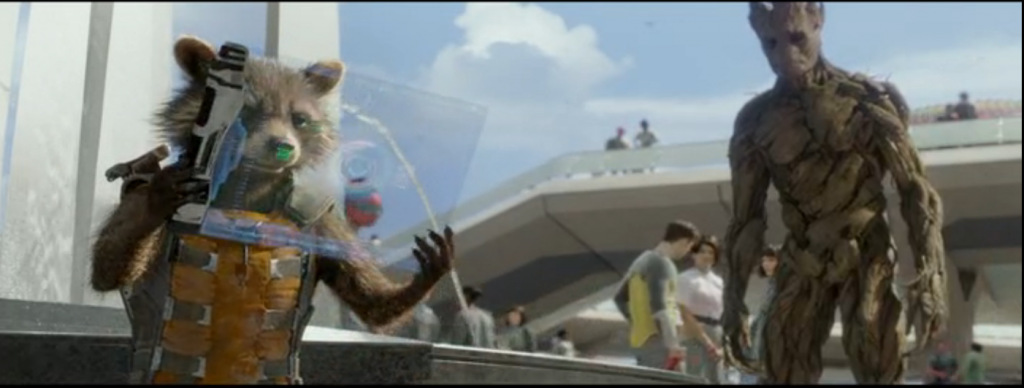
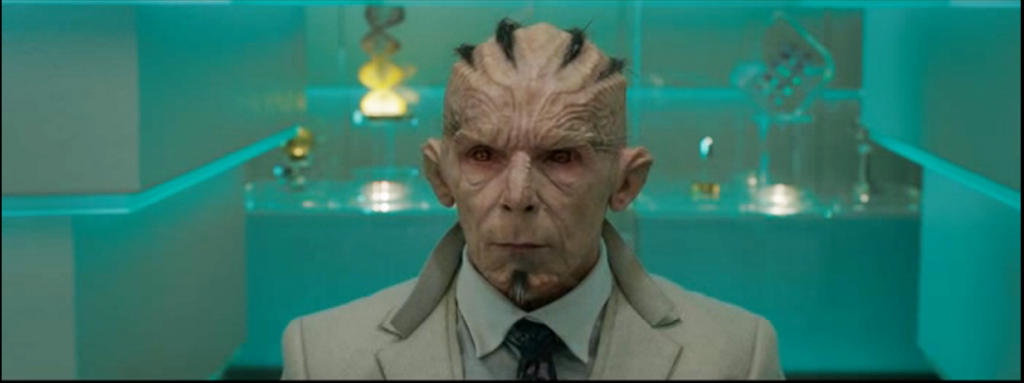
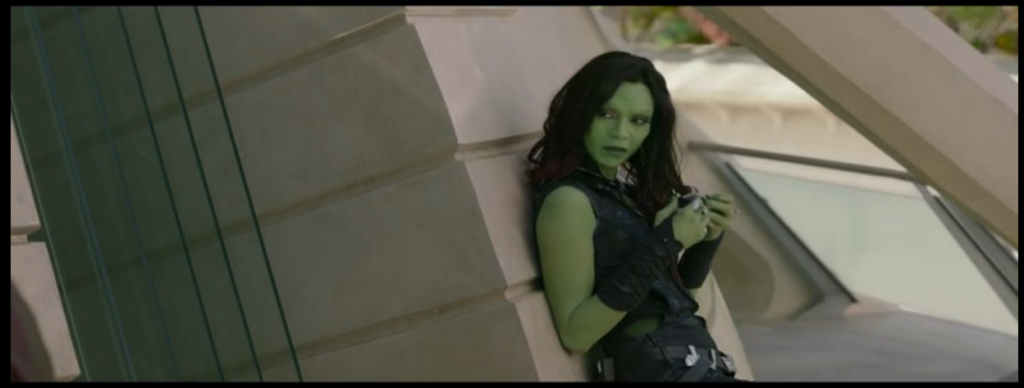
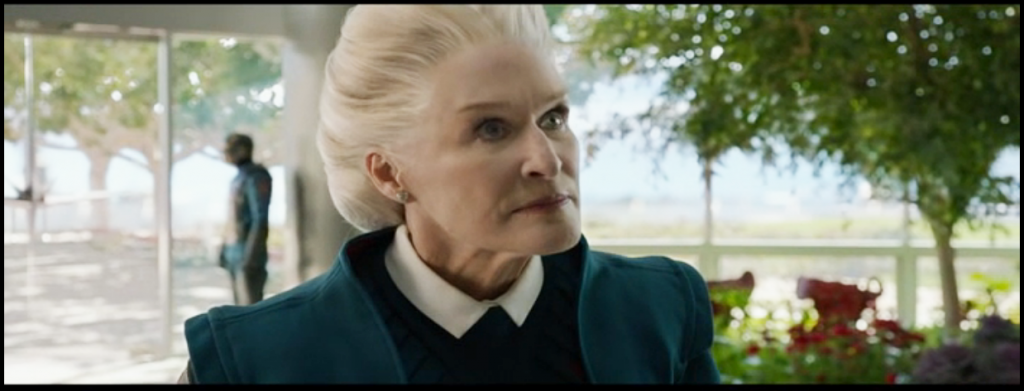
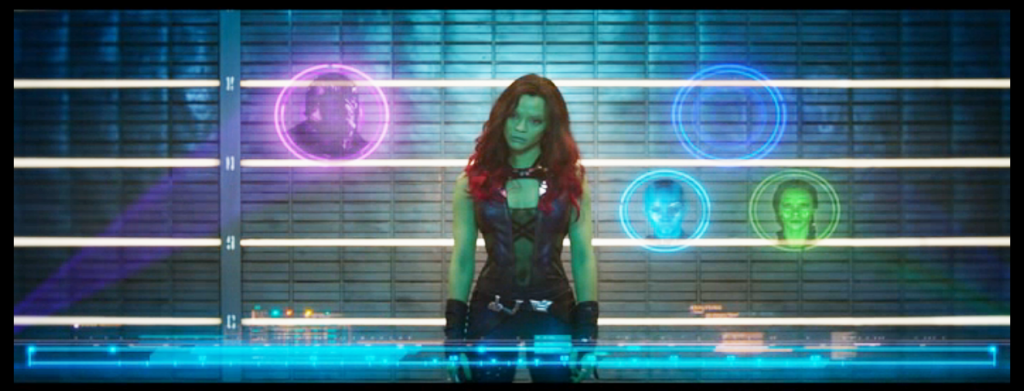
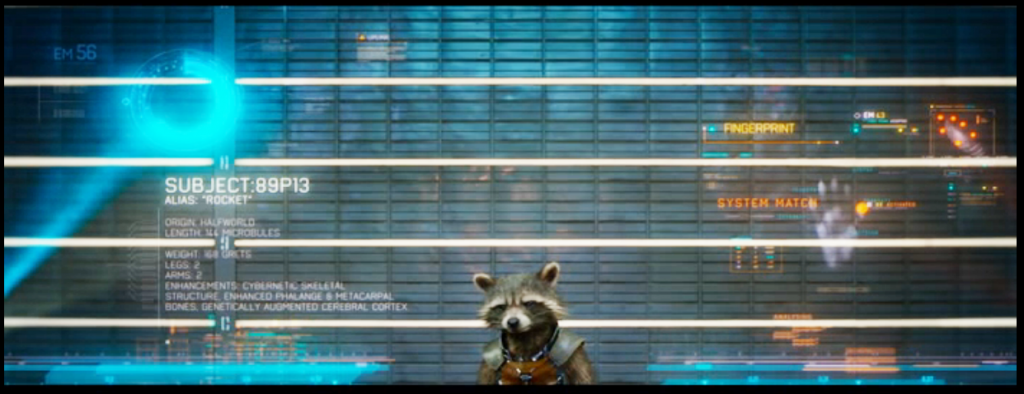
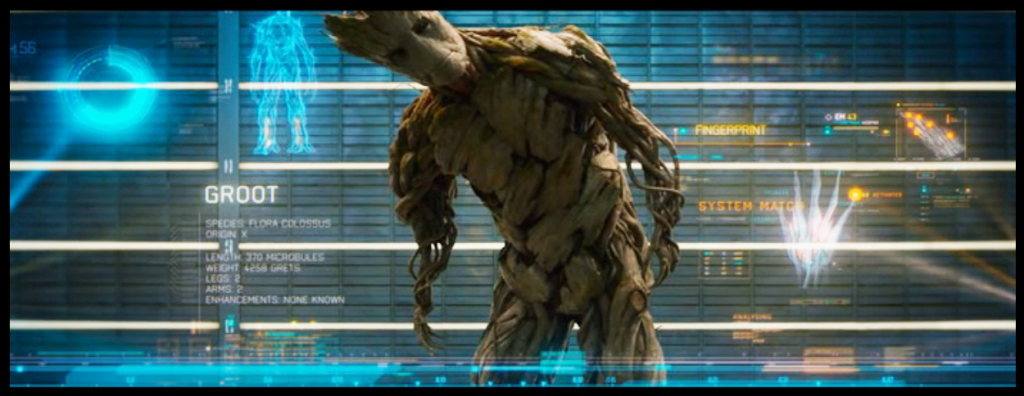
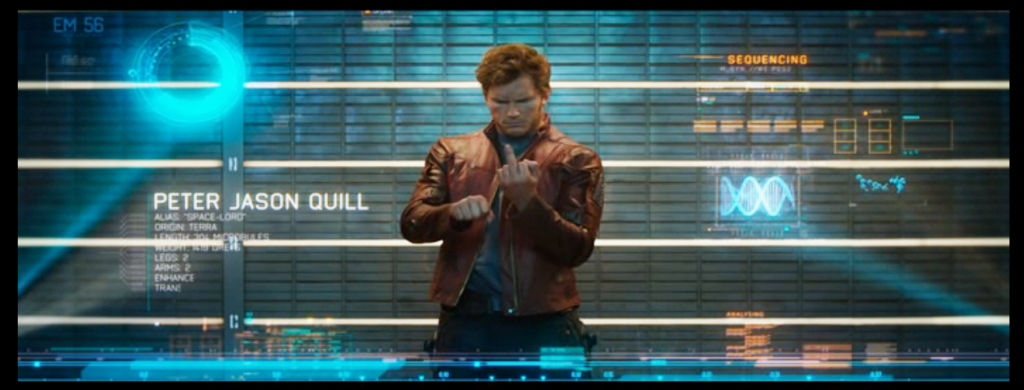
Notably, Star Lord, scourge of the space-lanes uses non-lethal weaponry (or, Gamora is just so tough she can take a lethal shock-blast and Star Lord is cold enough to try to execute her with a shot in the back …).
Contrast to Rocket who HAS non-lethal weaponry–and uses it when they want to take Peter alive–but certainly doesn’t use stun-bolts as his go-to.
Then again, the “good guy” Nova force lock people up in a pretty brutal prison system that seems to be less of a state-run institution and more of like a private-prison black-site or something.
Here’s my question: does all the middle-men make Guardians brilliant … or just sloppy? I remember watching Pirates of the Caribbean 3 and, towards the end, feeling like I needed a diagram to keep track of who was on whose team and why. Guardians, I think, needed the middle-men to have the plot develop as it did (have various parties stay in motion, etc.). So I’m thinking it was pretty brilliant.
But I have to wonder; for a movie already taking so many risks (new characters, relatively unknown property, big budget, valuable brand) do you think anyone at the script-working sessions went “Are audiences going to be able to keep all this straight??”
The Nova corpsmen say (maybe only in the deleted scene?) that the the Guardians are only being sent to the Kyln because their local cells are full to capacity.
I do wonder what would happen once The Collector got his hands on another Infinity Stone. Does he have the resources to protect himself from Thanos?
Also, if it was Nebula and Gamora’s job to take the orb to Thanos (seems reasonable), why didn’t Gamora wait until then to turn the tables? Maybe she thought she could avoid dealing with her sister this way.
John C Reilly mentions that Gamora and Nebula are “on loan” to Ronan, I guess as temporary henchmen? I’m not sure. If they were around to get the orb in the first place, why did he send Korath and his goons?
I did wonder how Corpsman Dey seems to know all this about Thanos’s kids, but nothing about the rest of the broader story. I guess “known affiliates could have come up on a screen.
I think there’s a reason why Gamora doesn’t want to wait to turn the tables, one that I think ties in very well with the basic message and final “teams’ in the movie. Gamora wants to sell the doohikey and use the money to get a new life, and her ‘sister’ Nebula wants bloody revenge on Thanos. For Gamora, ‘turning the tables’ wouldn’t accomplish anything.
Obviously, running away after selling a weapon of mass destruction isn’t really reasonable or viable, but the difference of impulse between “I had enough of this, so now I want something different” and “I’ll get the fuckers who did this to me” is significant.
I’m sure they asked that question at every step of development, which is why, in the “line-up” montage, we have John C Reilly recap who everyone is and what their affiliation is.
The orb-chase sequence contains one of my favorite jokes in the movie, and the detail that really got me on board with it: in a high-tech, space opera setting, Rocket and Groot try to capture Peter by putting him in a big bag.
I liked that. Groot’s the quintessential low-tech bagtree.